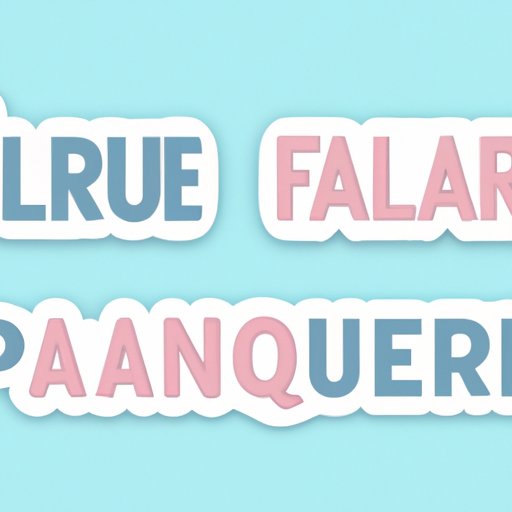
Introduction
Bonjour! Welcome to this beginner’s guide on how to say hi in French. Whether you’re planning a trip to France, learning French for fun, or simply expanding your linguistic skills, knowing how to greet someone properly is an essential part of communication. In this article, we’ll explore the various ways to say hi in French, from basic greetings to more advanced expressions and cultural nuances. Let’s dive in!
“Bonjour! How to Say Hi in French – A Beginner’s Guide”
French is a language of passion and romance, and it’s spoken not just in France, but also in many other countries and regions around the world. As with any language, there are regional differences and cultural nuances to consider when using French greetings. However, don’t let that intimidate you! With a bit of practice and confidence, you can easily learn the basics of French and impress your friends, colleagues, or that special someone you’ve been eyeing.
To start off, remember that French is pronounced differently than English. There are many silent letters, and certain combinations of letters, such as “eu” or “ai,” have their own unique sounds. Therefore, it’s important to study the basics of French pronunciation, such as how to correctly pronounce vowels, consonants, and accents. Once you have a basic understanding of French pronunciation, you’ll be able to pronounce French greetings correctly and with confidence.
“French Salutations 101: 5 Simple Greetings to Use Right Away”
The most common French greeting is “Bonjour,” which means “Hello” or “Good day.” It’s a versatile greeting that can be used in any formal or informal situation. Another simple greeting is “Salut,” which is more casual and is equivalent to “Hi” or “Hey” in English. Other basic French greetings include “Comment ça va?” (How are you?), “Ça va?” (How’s it going?), and “Bienvenue” (Welcome).
To help you remember the pronunciation of these greetings, here are some examples of how they sound:
- Bonjour – bohn-zhoor
- Salut – sah-lü
- Comment ça va? – koh-mohn sah vah
- Ça va? – sah vah
- Bienvenue – byan-vuh-noo
“10 French Greetings to Impress Your Francophile Friends”
If you want to add some pizzazz to your French greetings, try using some of these advanced expressions:
- Bonsoir – bohn-swaahr (Good evening)
- Salutations distinguées – sah-loo-tah-syohn dees-tahn-gwee (Distinguished greetings, used in formal letters)
- Enchanté(e) – ahn-shahn-tay (Nice to meet you, used in formal or social situations)
- Bonne journée – bawn zhur-nay (Have a good day)
- À bientôt – ah byahn-toh (See you soon)
It’s important to note that in France, social etiquette is highly valued, and how you greet someone depends on various factors, such as the time of day, the relationship between the speakers, and whether the situation is formal or informal. For example, using “enchanté(e)” may come across as too formal in a casual setting, while using “salut” with an older person may be too informal or disrespectful. Therefore, it’s a good idea to observe how native speakers greet each other and adapt accordingly.
“Beyond Bonjour: Alternative Ways to Say Hello in French”
Just like how English has various regional slang and greetings, French also has its own unique expressions. Here are some fun and quirky French greetings to try out:
- Coucou – coo-coo (Hi/Hey, used in a familiar or playful tone)
- Salut les potes – sah-lü lay poh-tuh (Hi friends, used in a casual setting)
- Salut la compagnie – sah-lü lah kohm-pah-nyee (Hi everyone, used in a festive or social setting)
- Bonjour à tous et à toutes – bohn-zhoor ah toos ay tahwt (Hello everyone, used in a formal or public setting)
- Bien le bonjour – byahn leuh bohn-zhoor (A gracious good morning to you)
“Mistakes to Avoid When Saying Hi in French”
Even if you’ve practiced your French greetings a hundred times, there are still certain mistakes or pitfalls to watch out for. For example:
- Speaking too loudly or too quietly: In France, it’s common to speak in a softer or more subdued tone, especially in formal situations. Speaking too loudly or too boisterously can come across as rude or unprofessional.
- Using informal language with strangers or elders: French culture places a high value on respect and formality, especially with people you don’t know well. Using “tu” instead of “vous” (the informal and formal versions of “you,” respectively) or using slang or vulgar language can be seen as impolite.
- Mispronouncing common words or greetings: Nothing screams “non-native speaker” more than mispronouncing simple French words like “bonjour” or “merci.” Practice your pronunciation regularly until it becomes natural and fluid.
- Ignoring regional dialects or accents: Just like English, French has various regional dialects and accents that differ in pronunciation, vocabulary, and grammar. Don’t be surprised if you hear different greetings or phrases depending on where you are in France or the Francophone world.
Conclusion
Voilà! You’re now armed with the knowledge and confidence to say hi in French like a pro. From basic greetings to more advanced expressions, there’s a French greeting for every situation and personality. Remember to practice regularly, observe cultural norms, and always be open to learning new vocabulary and expressions. Who knows, you may even impress a native French speaker with your fluency and finesse.





